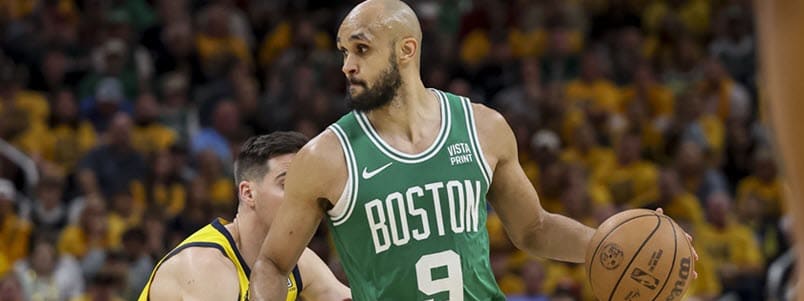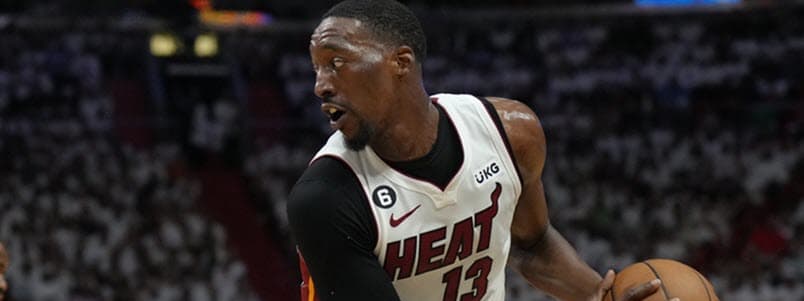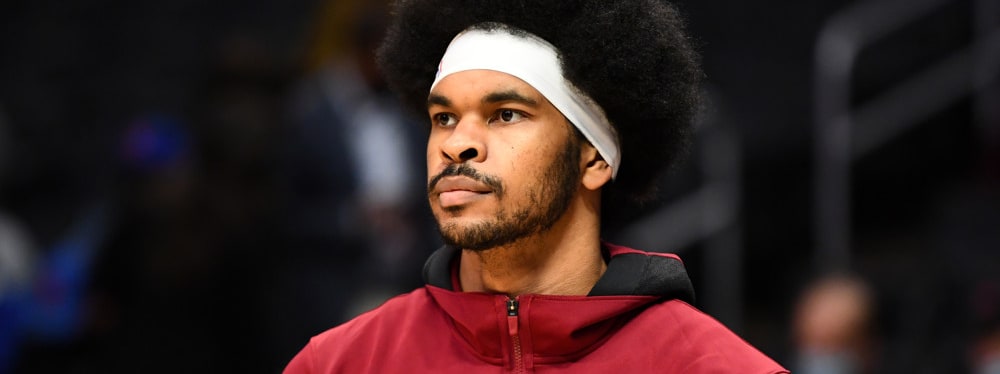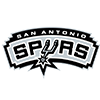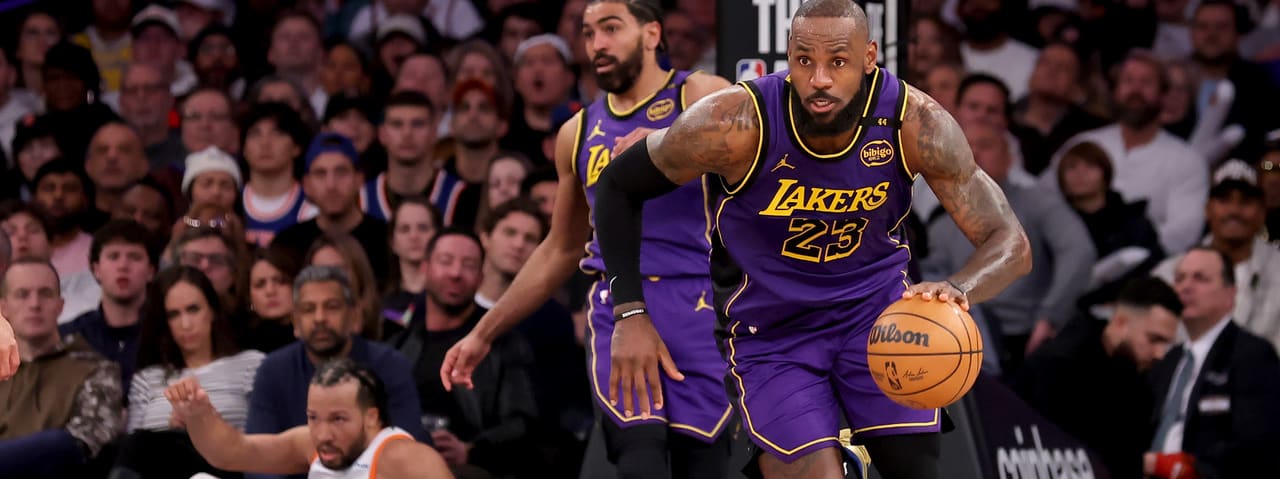Recent RotoWire Articles Featuring Harrison Barnes
See More
Barnes is now 31 years old and entering the downside of his career, despite having an effective season for one of the league's most surprising teams. Most of his numbers were down from the previous season, but he was incredibly durable, playing in all 82 games for the Kings. Barnes was worth an 11th-round fantasy pick last season on a per-game basis, but when you add in the fact he didn't miss a single game, his total value jumps up to a seventh-round pick. With guys like Keegan Murray and Kessler Edwards both likely to take a step forward this season, along with Barnes' advanced age, it's not hard to see him dropping off a bit this season. Barnes' shooting is effective from both the floor and free throw line, and he doesn't turn the ball over, but there's not a lot to get excited about when it comes to his fantasy value. He'll be an effective late-round pick even if he slips a bit and won't really hurt managers anywhere. But there's no reason to target him until late in fantasy drafts.
Barnes has not reached the status he had during his years with the Mavericks regarding his offensive numbers, but the veteran continues to be a consistent performer who can score at an above-average rate while also providing value in other categories. Such was the case during the 2021-22 season, when he averaged 16.4 points, 5.6 rebounds, 2.4 assists, 0.7 steals and 0.2 blocks per game while shooting 46.9 percent from the field and 39.4 percent from three-point range. While Barnes is not going to stand out in any category, he's scored at least 16 points per game in five of the last six seasons, and with the Kings failing to make substantial moves in the offseason, it seems fair to expect those kinds of figures again for the veteran. He can be targeted in the final rounds of most fantasy drafts.
Barnes had a surprising bounce-back season as a 28-year-old last season. After ranking outside of the top 140 over the prior two seasons, the forward ranked 88th in per-game production. Much of that improvement was the result of increased efficiency, as Barnes put together the best true-shooting percentage (62.6) of his career. That was partially due to Barnes completely cutting out long mid-range jumpers -- he took just six all season -- and he replaced those shots with more three-pointers. Barnes also showed better playmaking ability, as he handed out a career-high 3.5 dimes per game despite the presence of ball-dominant point guard De'Aaron Fox and impressive rookie guard Tyrese Haliburton. Heading into 2021-22, Barnes' role could stay stagnant, though there's potential for a slight decrease. The Kings drafted guard Davion Mitchell, which could lead to more three-guard lineups, forcing Barnes to play power forward, where he'd be competing with Marvin Bagley for minutes. Barnes is the best of that trio, but the Kings are still rebuilding, so they have to find a way to get their young players meaningful minutes. Regardless, Barnes figures to be a relatively safe option in the final rounds of most standard drafts as a 30-35-minute player.
Barnes remained a peripheral offense option for the Kings in 2019-20. The forward averaged 14.5 points, 4.9 rebounds and 2.2 assists in 34.5 minutes. His primary contributions to fantasy managers are scoring, field-goal percentage (46.0) and threes (1.4). Ultimately, he's a high-minutes, low-usage offensive player who likely doesn't need to be drafted in most shallower fantasy leagues. Even in deeper leagues, he can be selected near the end of drafts. Given his workload, Barnes has a pretty high floor, but there are plenty of other players with higher upside to gamble on at the end of most drafts. The best chance for Barnes to improve would likely be on another team where he'd be a primary offensive option -- like he was in Dallas -- but it would be a huge risk to bank on that happening.
Barnes was putting up 17.7 points over 49 games with Dallas before being dealt to the Kings in February of last season. He saw a slight decrease in production following the trade (14.3 PPG in 28 contests), despite playing 1.6 more minutes per matchup. After re-signing with Sacramento over the offseason, the 27-year-old forward is expected to slot into a similar role during the 2019-20 campaign as the team's starting small forward. He converted on 39.5 percent of his threes over the course of last year -- his best shooting performance since the 2014-15 season when he shot 40.5 percent from downtown. Barnes also knocked down a career-best 2.3 treys per contest a season ago, which is quite the improvement from 1.5 threes per game during 2017-18. The Kings didn't make any jaw-dropping moves in free agency, which is good news for Barnes, who should continue to see plenty of opportunities to shoot the basketball alongside De'Aaron Fox and Buddy Hield at the two guard spots.
With only minor changes to the roster, Barnes unsurprisingly finished the 2017-18 campaign with numbers similar to a year prior. He remained the team's top scoring threat at 18.9 points per game, while adding 6.1 rebounds and 2.0 assists across 34.2 minutes. The six-year forward also saw a spike in his three-point production and tallied a career-high 1.5 deep balls at a 35.7 percent clip. However, the Mavericks made some fairly significant upgrades to the roster in the offseason. Most notably was the signing of DeAndre Jordan, who's set to enter the starting five at center immediately. Jordan was second in the league last year with 15.2 rebounds per game, which means Barnes' board totals are very likely to take a hit. In addition, Dennis Smith is coming off a very impressive rookie season and will likely be involved even more in the offense in Year 2, while Luka Doncic was taken with the third overall pick in the 2018 NBA Draft and is expected to be an offensive contributor immediately as an NBA ready player coming out of Europe. That means there's more mouths to feed overall, so Barnes' 15.7 field goal attempts per game and scoring totals are also at risk of declining. Fantasy owners can continue to rely on him for his production on offense, but he's likely going to be a one-trick pony for the most part if Jordan's presence does significantly impact Barnes' rebound totals as expected.
Following four years with the Warriors in a complementary role on a stacked roster, Barnes finally got a taste of the limelight in his first year with Dallas. He immediately jumped into the Mavericks rotation as their go-to player after signing a max four-year, $94 million contract in the offseason. While his averages of 5.0 rebounds, 1.5 assists and 1.0 three-pointer all remained relatively similar to his last few years with the Warriors, it was his scoring that took a huge jump, which was always expected with a move to a much less talented roster. He commanded the ball more than any other player and averaged a career-high 19.2 points, up from the 11.7 points he averaged a year prior. He shot 46.8 percent from the field and did see his three-point shooting fall to 35.1 percent, though that didn't hurt him much considering his usage skyrocketed. That shouldn't change much heading into the 2017-18 campaign. While the Mavericks added the electric point guard Dennis Smith with the ninth overall pick in the 2017 NBA Draft, that may actually help Barnes' numbers, rather than hurt them. Barnes was often swarmed by defenses to force him to give the ball up, so with more attention potentially being diverted to Smith, Barnes could get more open looks. Dirk Nowitzki is also nearing 40 years old and will likely continue to have his workload scaled back, opening a few extra looks here and there. With all that said, Barnes numbers will likely remain relatively similar to a season ago, as he'll remain the Mavericks' top option on offense while spending time at both small forward and power forward.
Barnes' struggles in the NBA Finals overshadowed what was otherwise a productive season in a complementary role for the Warriors. While often serving as the team's fourth option offensively, Barnes averaged a career-high 11.7 points to go with 4.9 rebounds and 1.8 assists per game. The production earned him a massive payday in the form of a four-year, $94 million deal from the Mavericks, who will count on Barnes to step into a larger role as he enters his age-24 season. Whether the U.S. Olympic gold medalist is up to the task remains to be seen. Barnes flourished as a role player in Golden State, but it's fair to question how much he benefited from playing alongside Klay Thompson, Draymond Green, Andre Iguodala and a certain two-time MVP. In Dallas, Barnes won't necessarily be asked to be the No. 1 option, but he's arguably the highest-upside player on a team that will lean heavily on veterans Deron Williams, Dirk Nowitzki and Wesley Matthews. After approaching 31 minutes per game last season, Barnes' playing time may not creep much higher, but he expects to see more opportunities as a shooter and one-on-one playmaker, which should translate to a noticeable increase in his per-game scoring.
Barnes went from an up-and-coming rookie wing player in the NBA to an unconfident and tentative mess after his sophomore season. What happened? For one, he went from being a starter to a reserve. Former head coach Mark Jackson put the weight of the second unit on his shoulders, asking him to be the primary scorer. His PER dropped to 9.85 during his sophomore season, making him a top priority of the new head coach Steve Kerr, who theorized Barnes wasn't used properly in the previous coaching regime's system. Kerr's motion offense benefitted no player more than Barnes, who was given the starting small forward job over Andre Iguodala in training camp. No longer being asked to create off the dribble, the ball eventually found Barnes, leading to career-highs in three-point (40 percent) and two-point shooting (51 percent). He averaged 10.1 points along with 5.5 rebounds, 1.4 assists, 0.7 steals, and 0.2 blocks in 28 minutes per game, while starting all 82. This is a critical year for Barnes. He's on the final year of his rookie deal. The Warriors would like to retain him, but they've just shelled out big dough for Draymond Green, one year after showering Klay Thompson with riches. And the Stephen Curry payday is coming. They may hold off until he becomes a restricted free agent next summer to see what the market price for Barnes becomes.
Barnes had a disappointing sophomore season, failing to make a developmental leap generally seen in high draft picks between seasons one and two. In 78 games, he averaged 9.5 points on 40-percent shooting with 4.0 rebounds, 1.5 assists, 0.8 steals, and 0.3 blocks in 28 minutes per game. After the All-Star break, he shot just 36 percent from the field and 26 percent from three-point distance. The Warriors envisioned the athletic wing becoming the team's premier scorer off the bench, but Barnes never delivered in that role. He's often deferential on the court, passing up shots or not driving to the basket enough. It might be a confidence issue. It would help if Barnes can develop a better handle. That might give him the confidence to take the ball to the hole more willingly. New head coach Steve Kerr believes Barnes can thrive with better spacing. Barnes will be project number one for assistant coach Alvin Gentry, known primarily for his offensive mind. So, while Barnes' regression from year one to two is off-putting, the change that comes with new voices calling the shots creates hope that Barnes can develop consistency, confidence, and a drive to get better. Look for him to play primarily off the bench, backing up Andre Iguodala at small forward.
Barnes' rookie season was a mixed bag, but he hinted at being an exciting wing player capable of carrying a scoring load and creating a shot for himself. Those hints didn't sustain over long stretches, and he was often the deferential rookie, letting the veterans take charge. He was good in the postseason and appeared destined for a larger role this coming season – until the Warriors swung a deal for Andre Iguodala, who is expected to start at Barnes' small forward spot. That means Barnes will play a support role on the wing, and the development in year two we expected might be delayed. Barnes will be part of the rotation and will be part of smaller lineups.
Barnes will be in the mix for the starting small forward spot. He has ideal size at the three and his mobility/wingspan is suited to defending. Offensively, he has a mid-range game and can create space for himself, but mediocre ball-handling/dribbling limit his ability to get to the rim and create shots. He’s a good rebounder at the three, but he may not get starters’ minutes right away.
